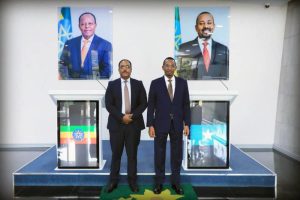
Ethiopia is striving to achieve lasting peace and stability, taking bold steps like national dialogue and transitional justice to build consensus on critical issues and resolve long-standing disputes. To ease tensions, address conflicts, and bring armed groups to the negotiation table, the government has extended an olive branch. This commitment has resulted in notable achievements, such as the Pretoria Accord with the Tigray People’s Liberation Front (TPLF) and, more recently, a peace deal between the Oromia administration and the self-proclaimed Oromo Liberation Army (OLA).
These efforts clearly signal the government’s dedication to resolving conflicts through peaceful means. The dividends of peace have already been felt by communities that have endured the chaos and destruction of war. For years, conflicts in certain states and pockets of the nation have caused immense civilian suffering and extensive property damage. Recognizing this, the government has taken the lead in advocating for peaceful settlements, a stance that has garnered widespread public support.
The recent demonstrations in Amhara state are a powerful reminder that violence is no longer a viable option for addressing grievances or pursuing demands. These peaceful rallies, held across the region from Gendawuha to Gondar, underscore the public’s desire for non-violence and dialogue.
Protesters carried placards calling for unity, peace, and development, encapsulating the aspirations of the region. The rallies at Gondar’s Fasiledes Stadium reflected a collective rejection of war and a deep yearning for progress and stability. The participation of youth, women, elders, religious leaders, students, and government employees highlights a community-wide commitment to dialogue over discord.
Deputy Prime Minister Temesgen Tiruneh commended the public’s overwhelming support for peace while condemning extremism. He emphasized a crucial truth: lasting peace can only be achieved through collaboration and shared commitment. His call for armed groups to embrace dialogue reflects the government’s openness to reconciliation and its determination to create a stable and unified Ethiopia.
The peaceful demonstrations in Amhara and the joy witnessed in Oromia following the OLA peace deal are strong indications of the Ethiopian people’s unwavering support for peace initiatives. These events demonstrate that peace is not just a government responsibility but a collective endeavor that requires participation from all segments of society.
Deputy Prime Minister Temesgen Tiruneh noted the recent public demonstrations on social media, stressing the importance of collective action in achieving lasting peace and development in the Amhara region. He emphasized that the public response supports the government’s calls for peace and rejects extremism.
The Deputy Prime Minister urged all stakeholders to act as guardians of peace and development, emphasizing the need for a united front to transform the Amhara region into a hub of tranquility and progress. He stated the Ethiopian government’s commitment to peaceful conflict resolution and encouraged armed groups to engage in dialogue, recognizing that extremism ultimately benefits no one.
In his parts, Arega Kebede, Chief Administrator of the Amhara region, highlighted the demonstrations as a powerful reminder of the need for dialogue in conflict resolution. He called on all parties to address grievances through peaceful means, emphasizing that the unified message of the protests is a demand for an end to conflict and the pursuit of peace and development.
The broader significance of these events reflects public support for the government’s initiatives aimed at fostering peace. Arega underlined by stating that peace is fundamental to a strong government and that the recent demonstrations underscore the people’s desire for peaceful solutions.
Following years of conflict in northern Ethiopia, a significant breakthrough occurred when the Ethiopian government and the Tigray People’s Liberation Front (TPLF) engaged in dialogue. This long-standing war had caused immense suffering and a severe humanitarian crisis, displacing millions of people.
Through open discussions, both parties recognized the urgent need for peace and stability. Their willingness to negotiate signifies a crucial shift toward reconciliation, fostering hope for a more harmonious future. The resolution of this conflict not only benefits those directly involved but also paves the way for broader national healing and development.
The Pretoria Agreement marked a key moment in the efforts to restore peace and stability. Negotiated in South Africa, this landmark accord aimed to cease hostilities and initiate a reconciliation process. By addressing key issues such as humanitarian access, ceasefire implementation, and political dialogue, the agreement provided a framework for rebuilding trust among affected communities.
In the aftermath, the agreement has shown promise, with both parties making strides toward reducing violence and allowing humanitarian aid to reach those in need. The commitment to dialogue has opened pathways for discussions about governance and independence, which are crucial for long-term stability.
The Pretoria Agreement serves as a testament to the power of diplomacy in resolving conflicts and highlights the potential for peaceful solutions in a region marked by turmoil.
The value of peace is immeasurable; it serves as the foundation for a prosperous society. The Ethiopian government’s proactive approach, coupled with the armed groups’ willingness to engage in dialogue, reflects a shared recognition of the prominence of harmony and understanding in a nation with a history of conflict.
Armed forces in various regions must acknowledge the profound strain that violence and instability place on communities. Recognizing this reality is vital for creating a more peaceful environment. Instead of resorting to weapons, these groups should prioritize communication and understanding.
Through dialogue and negotiations, a path to sustainable solutions and mutual respect can be established. By responding positively to the government’s call for peace talks, armed groups can play a constructive role in society and help forge a future free from fear and violence.
The government has not only engaged in peaceful talks with the TPLF but also with armed groups across the country. Recently, the Oromia Regional Government successfully initiated dialogue to resolve the ongoing conflict with the former leaders of the Oromo Liberation Army (OLA), Jaal Segni Negasa, marking a significant step toward restoring peace. This achievement underscores the importance of communication and negotiation in addressing political tensions.
Furthermore, the Ethiopian government must continue to build on this momentum by reinforcing its commitment to peace and the rule of law. Sustaining these efforts is crucial for fostering stability and trust within the community. Additionally, active participation from society is essential in the peace-building process. Citizens, civil organizations, and local leaders all have vital roles to play in promoting harmony and understanding.
By working together, the government and the public can create an environment conducive to lasting peace. The recent dialogue serves as a reminder that cooperation and mutual respect are fundamental to overcoming divisions and ensuring a prosperous future for all Ethiopians.
BY FIKADU BELAY
The Ethiopian Herald December 22/2024



